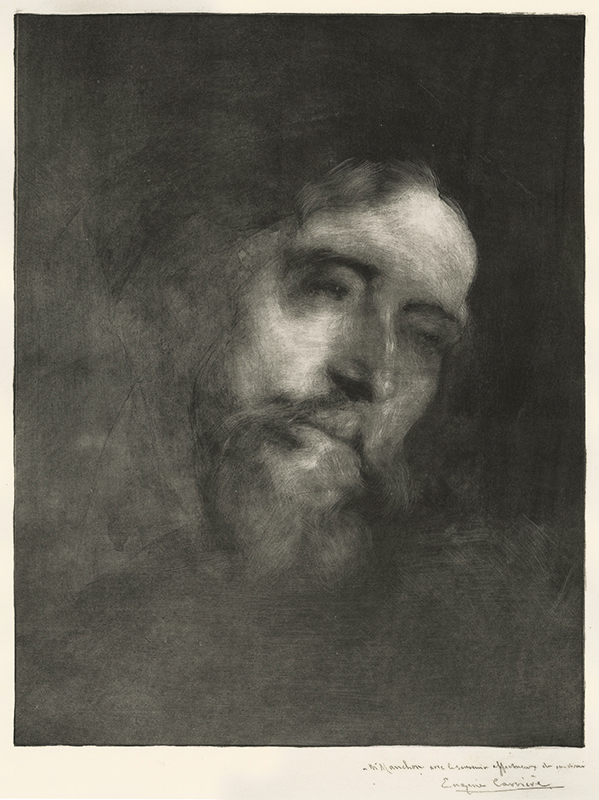
19th, 20th & 21st Century Fine Prints
707-546-7352 · fax 707-546-7924 · web: www.annexgalleries.com · email: artannex@aol.com
Alphonse Daudet by Eugene Carriere



Alphonse Daudet
Eugene Carriere
Alphonse Daudet
Eugene Carriere
1849 - 1906 (biography)This mysterious portrait, done in 1893, is of French novelist Alphonse Daudet (1840-1897) by Symbolist painter/printmaker Eugene Carriere. Like his contemporary, Odilon Redon, he coaxes the subject's image out of the dark, similar to a mezzotint. Drawing, scratching, and scraping the stone, he worked from dark to light, attempting to capture the essence of Daudet.
Carriere's lithographic technique was unique in printmaking and has inspired generations of printmakers since. This work is printed on a thin Asian paper in order to capture all the subtlety in the drawing and then is glued to a heavier support sheet to protect it from damage while being handled.
This proof is from the first state and is dedicated by Carriere to "M. Manchon", probably French Victorian printmaker Gaston Albert Manchon (1855-1951), it translates to "to Mr. Manchon with fond memories of (unreadable).."
Eugene Carriere was born in Gournay-sur-Marne, France on January 6, 1849. From his five years studying in Strasbourg as an adolescent, where he was labeled a mediocre student, to his tutelage at the Quentin La Tour School and study of lithography with Gustave Moreau, up until his death in 1906 at the height of a successful career, Eugene Carrier never stopped sketching. He confounded his teachers and littered his home with thousands of pages of penciled figures and expressions that caught his attention. A short-lived commercial lithography career and a late-blooming artistic success never dampened his desire to capture a mood or stance, and in his prints we find that instantaneous beauty-portraits of a moment, perhaps, as opposed to a person.
With the support of his family, and the financial backing of La Tour, he set off on his own to study at the École des Beaux-Arts in Paris at age 19. Throughout his studies he retained a strong focus on the importance of that which inspired him most: family, love, and truth. His stance on political and social issues stemming from his experiences as a soldier and prisoner in the Franco-Prussian war remained an important part of his life and work; they solidly placed him in the ranks of artists, writers, poets and performance artists who spoke out against injustices through their art. Carriere and his contemporaries hailed the dawn of the fin de siécle: an end to an era and the beginning of a revolution in art.
He was equally disliked and admired for his near abandonment of color in his later works. Like La Tour before him, he portrayed his subjects as he saw them, revealing a truth through holistic observation rather than superficial flattery. He greatly admired friend and contemporary Auguste Rodin's sculpture, drawing inspiration in the singularity of color as a means of transporting the figure to the forefront, stripping away the "glitter" of traditional art and revealing what he considered the most essential component in a subject: emotion. Many of his lithographs are at first ghostly, haunting images, appearing to emerge from a dark gloom; yet upon further examination the contrasting highlights, carefully worked and sparingly bright, capture the subject's strongest expression. What was once gloom has become simply the necessary and harmonious opposition of light- illuminating what many others before him had needed line and definition to capture.
Eugene Carriere died in Paris on March 27, 1906.

